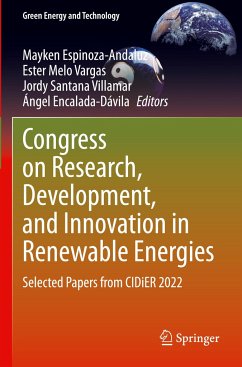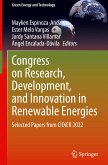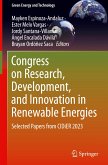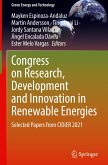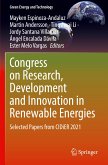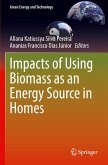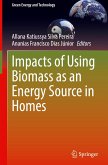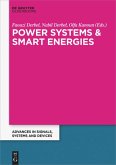Congress on Research, Development, and Innovation in Renewable Energies
Selected Papers from CIDiER 2022
Herausgegeben:Espinoza-Andaluz, Mayken; Melo Vargas, Ester; Santana Villamar, Jordy; Encalada-Dávila, Ángel
Congress on Research, Development, and Innovation in Renewable Energies
Selected Papers from CIDiER 2022
Herausgegeben:Espinoza-Andaluz, Mayken; Melo Vargas, Ester; Santana Villamar, Jordy; Encalada-Dávila, Ángel
- Broschiertes Buch
- Merkliste
- Auf die Merkliste
- Bewerten Bewerten
- Teilen
- Produkt teilen
- Produkterinnerung
- Produkterinnerung
The 2022 Congress on Research, Development, and Innovation in Renewable Energies (CIDiER 2022) promotes international collaboration on ideas and dialogue around climate change solutions through research and development that leads to clean energy innovation via renewable energies. The selected papers cover both theoretical and applied research that will strengthen the implementation of renewable energy projects between universities, research centers, and private companies in Latin America.
Andere Kunden interessierten sich auch für
![Congress on Research, Development, and Innovation in Renewable Energies Congress on Research, Development, and Innovation in Renewable Energies]() Congress on Research, Development, and Innovation in Renewable Energies139,99 €
Congress on Research, Development, and Innovation in Renewable Energies139,99 €![Congress on Research, Development, and Innovation in Renewable Energies Congress on Research, Development, and Innovation in Renewable Energies]() Congress on Research, Development, and Innovation in Renewable Energies129,99 €
Congress on Research, Development, and Innovation in Renewable Energies129,99 €![Congress on Research, Development and Innovation in Renewable Energies Congress on Research, Development and Innovation in Renewable Energies]() Congress on Research, Development and Innovation in Renewable Energies213,99 €
Congress on Research, Development and Innovation in Renewable Energies213,99 €![Congress on Research, Development and Innovation in Renewable Energies Congress on Research, Development and Innovation in Renewable Energies]() Congress on Research, Development and Innovation in Renewable Energies154,99 €
Congress on Research, Development and Innovation in Renewable Energies154,99 €![Impacts of Using Biomass as an Energy Source in Homes Impacts of Using Biomass as an Energy Source in Homes]() Impacts of Using Biomass as an Energy Source in Homes123,99 €
Impacts of Using Biomass as an Energy Source in Homes123,99 €![Impacts of Using Biomass as an Energy Source in Homes Impacts of Using Biomass as an Energy Source in Homes]() Impacts of Using Biomass as an Energy Source in Homes123,99 €
Impacts of Using Biomass as an Energy Source in Homes123,99 €![Power Systems and Smart Energies Power Systems and Smart Energies]() Power Systems and Smart Energies58,99 €
Power Systems and Smart Energies58,99 €-
-
-
The 2022 Congress on Research, Development, and Innovation in Renewable Energies (CIDiER 2022) promotes international collaboration on ideas and dialogue around climate change solutions through research and development that leads to clean energy innovation via renewable energies. The selected papers cover both theoretical and applied research that will strengthen the implementation of renewable energy projects between universities, research centers, and private companies in Latin America.
Produktdetails
- Produktdetails
- Green Energy and Technology
- Verlag: Springer / Springer International Publishing / Springer, Berlin
- Artikelnr. des Verlages: 978-3-031-26815-1
- 2023
- Seitenzahl: 172
- Erscheinungstermin: 28. April 2024
- Englisch
- Abmessung: 235mm x 155mm x 10mm
- Gewicht: 271g
- ISBN-13: 9783031268151
- ISBN-10: 3031268156
- Artikelnr.: 70520197
- Herstellerkennzeichnung Die Herstellerinformationen sind derzeit nicht verfügbar.
- Green Energy and Technology
- Verlag: Springer / Springer International Publishing / Springer, Berlin
- Artikelnr. des Verlages: 978-3-031-26815-1
- 2023
- Seitenzahl: 172
- Erscheinungstermin: 28. April 2024
- Englisch
- Abmessung: 235mm x 155mm x 10mm
- Gewicht: 271g
- ISBN-13: 9783031268151
- ISBN-10: 3031268156
- Artikelnr.: 70520197
- Herstellerkennzeichnung Die Herstellerinformationen sind derzeit nicht verfügbar.
Mayken Espinoza-Andaluz, Ph.D., is a full professor at Escuela Superior Politécnica del Litoral (ESPOL) and co-supervisor of Ph.D. students in Heat Transfer and Energy Systems at Lund University. He earned his Ph.D. in Heat Transfer from the Department of Energy Sciences at Lund University. His areas of research include renewable energy, fuel cells, proton-exchange membrane fuel cells (PEMFC), solid oxide fuel cells (SOFC), physical and chemical phenomena, energy efficiency, Lattice Boltzmann methods (LBM), and computational modeling. He is a reviewer for several international journals, including the International Journal of Energy Research, International Journal of Hydrogen Energy, and Computers and Mathematics with Applications. Ester Melo Vargas is a researcher at Escuela Superior Politécnica del Litoral (ESPOL). Her research interests include data analysis applied to fault detection in fuel cells and behavioral sciences.In addition, Ms. Melo is the author and co-author of scientific articles that have been presented at congresses, conferences and scientific meetings. She received her bachelor's degree in audit and management control from ESPOL and now she is pursuing a Master's Degree in Human Talent Management with a focus on research. In addition, she is the principal researcher of a project that will explore the limits of human nature in Antarctica. Jordy Santana-Villamar is a researcher with the Center of Renewable and Alternative Energy at Escuela Superior Politécnica del Litoral (ESPOL). His area of research is electrochemical tests to evaluate the performance in fuel cells and redox flow batteries applying EIS technique, sweep current, linear, and circular sweep voltammetry; expanded graphite-resin composite materials development with secondary fillers for bipolar plates; and modeling on transport phenomena. He has published several scientific papers in journals including the International Journal of Hydrogen Energy, Journal of Electrochemical Society, and Energies. He has also participated in congresses, conferences, and meetings to present his research work. He received his bachelor's degree in mechanical engineering from ESPOL, obtaining a diploma of distinction in research. Ángel Encalada-Dávila is currently working as a software engineer at an Ecuadorian ATM company. He also collaborates as an external researcher (data scientist) at the Control, Modeling, Identification, and Applications Research Group (CoDAlab) at the Universitat Politècnica de Catalunya (UPC), Barcelona, Spain. His research interests include structural health monitoring (SHM) and fault prognosis applied to wind turbines and computer modeling applied to fuel cells. In addition, Mr. Encalada is the author and co-author of several scientific articles that have been published in the journals Sensors, Energies, and Processes. He received his bachelor's degree in mechatronics engineering from Escuela Superior Politécnica del Litoral (ESPOL).
Preface.- Organization Committee.- Biomass Energy.- Hydraulic Energy.- Hydrogen Energy.- Photovoltaic Energy.- Wind Energy.- Other Energy Sources.
Preface.- Organization Committee.- Biomass Energy.- Hydraulic Energy.- Hydrogen Energy.- Photovoltaic Energy.- Wind Energy.- Other Energy Sources.

